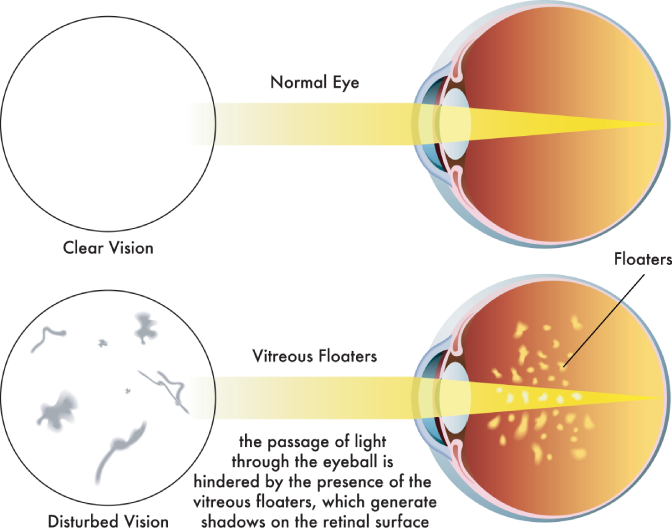50% OFF a Complete Pair of Glasses
*Restrictions apply. Click here for details.
What Causes Eye Floaters and Flashes?
Few visual disturbances are as distracting as tiny specks or sudden bursts of light in your field of vision. These drifting spots, thread-like shapes, or quick flickers often appear at the edges of your vision when looking at bright skies, a computer screen, or a plain wall. Eye floaters and flashes are common and usually a normal part of aging, but in some cases, they can signal more serious eye problems.
At eyecarecenter our doctors help patients understand these visual phenomena, rule out urgent issues, and determine the appropriate next steps. Learn what causes floaters and flashes, when to seek care, and the treatment options we provide.
What Are Eye Floaters?

Eye floaters, also called vitreous floaters, are tiny shapes that drift across your vision. They can appear as dark spots, squiggly lines, blurry patches, or other irregular forms. Many people describe them as “gnats” or “threads” that move when you try to focus on them. They are most noticeable against bright, plain backgrounds like a blue sky, white wall, or computer monitor.
Floaters develop inside the eye rather than on its surface. They are made of clumped collagen fibers in the vitreous humor, the clear gel between your eye’s lens and retina. Over time, especially with aging or nearsightedness, these collagen fibers can break down and form clumps, creating floaters that usually fade or become less noticeable over time.
Floaters can also appear during or after a posterior vitreous detachment (PVD), a natural process in which the vitreous gel separates slightly from the retina. PVD may cause sudden new floaters or a small cluster of them, sometimes accompanied by brief flashes of light. While most PVDs are harmless, sudden changes in floaters should always be evaluated to rule out more serious conditions.
What Floaters in the Eye Can Mean For Your Eye Health
Dr. Justin Gillette answers common questions about eye floaters, what they are, what causes them, and when they are concerning enough to see an eye doctor.
What Are Eye Flashes?
Eye flashes, or photopsias, are brief flashes of color or light that appear in your vision. Instead of the drifting spots or shapes you see with floaters, flashes look more like flickers, sparks, or lightning streaks off to the side of your vision. They may last only a moment, but they can be startling, especially if they appear suddenly or become more frequent.
Like eye floaters, flashes develop in the vitreous humor. As you age, the collagen in your body breaks down more quickly, causing the gel of the vitreous humor to shrink and pull away from the retina. This creates momentary flashes of light.
Eye floaters and flashes causes
Occasional floaters and flashes are normal occurrences, and they typically appear and subside quickly. They are sometimes more common early in the morning, while reading or after rubbing your eyes.
Frequent floaters and flashes can be a sign of a condition called posterior vitreous detachment (PVD), which is a natural change in the eye. While occasional flashes and floaters are symptoms of the collagen in the vitreous humor breaking down, PVD occurs when this layer of gel actually begins to detach from the retina. PVD isn't painful and doesn't usually cause vision loss, though it can potentially lead to complications that do.
While PVD and age are the most common causes of flashes and floaters, there are others, too. Some of the less serious causes of floaters and flashes can include:
Eye infections
Eye inflammation
Eye injury
Migraine or headache
Diabetes
More serious causes may include:
Choroidal neovascular membranes
Cytomegalovirus retinitis
HIV/AIDS
Detached and torn retina
Vitreomacular traction
Histoplasmosis
Stickler syndrome
When caused by a more serious condition, floaters and flashes typically occur alongside other symptoms.
Risk factors for floaters and flashes
Anyone can develop eye floaters and flashes. Nearsightedness and aging are linked to both symptoms, but there are other conditions that could put you at a greater risk of developing them, too.
Some risk factors for developing floaters and flashes include:
Eye injuries
A family history of eye problems
Cataract surgery
Yttrium aluminum garnet (YAG) laser surgery after cataract surgery
When to Seek Treatment
In most cases, floaters and flashes are harmless and will go away with time. But it is important to always see your doctor with the onset of new flashes and floaters to rule out the more serious causes. As mentioned above, one of the primary causes of floaters and flashes is PVD, a benign condition that occurs with age. While PVD by itself generally doesn't cause problems, it can lead to more serious complications. One of the most common complications is damage to the retina in the form of detachment, tears or hemorrhaging. Retinal detachment and other retinal damage typically require treatment and surgery to avoid vision loss. If retinal damage occurs because of PVD, you may notice severe vision changes alongside floaters and flashes. However, this isn't always the case, so it's important to see your eye doctor on a regular basis. Your eye doctor at eyecarecenter will diagnose PVD when it first occurs and know to look for signs of complications during your regular check-ups.
In addition, there are multiple other vision problems involving floaters and flashes that could signal a need to see your doctor. If vision loss occurs alongside floaters or flashes, that may indicate a more serious condition. If you experience sudden changes to your vision or multiple symptoms at once, visit your doctor as soon as possible. In the unlikely event that your floaters are caused by a more serious complication like a retinal tear or detachment, you may be a candidate for laser therapy or surgery.
Schedule an Eye Exam at eyecarecenter

If you are experiencing floaters and flashes without serious complications but they are causing you to have difficulty seeing, removing floaters with laser therapy may be an option for you. Consulting an eye doctor, like at eyecarecenter, will help you determine the risks and benefits of such a procedure. A comprehensive eye exam from eyecarecenter can help identify any causes of floaters and flashes, or any other eye issues you might be experiencing. Find a location close to you and schedule an eye exam today.
